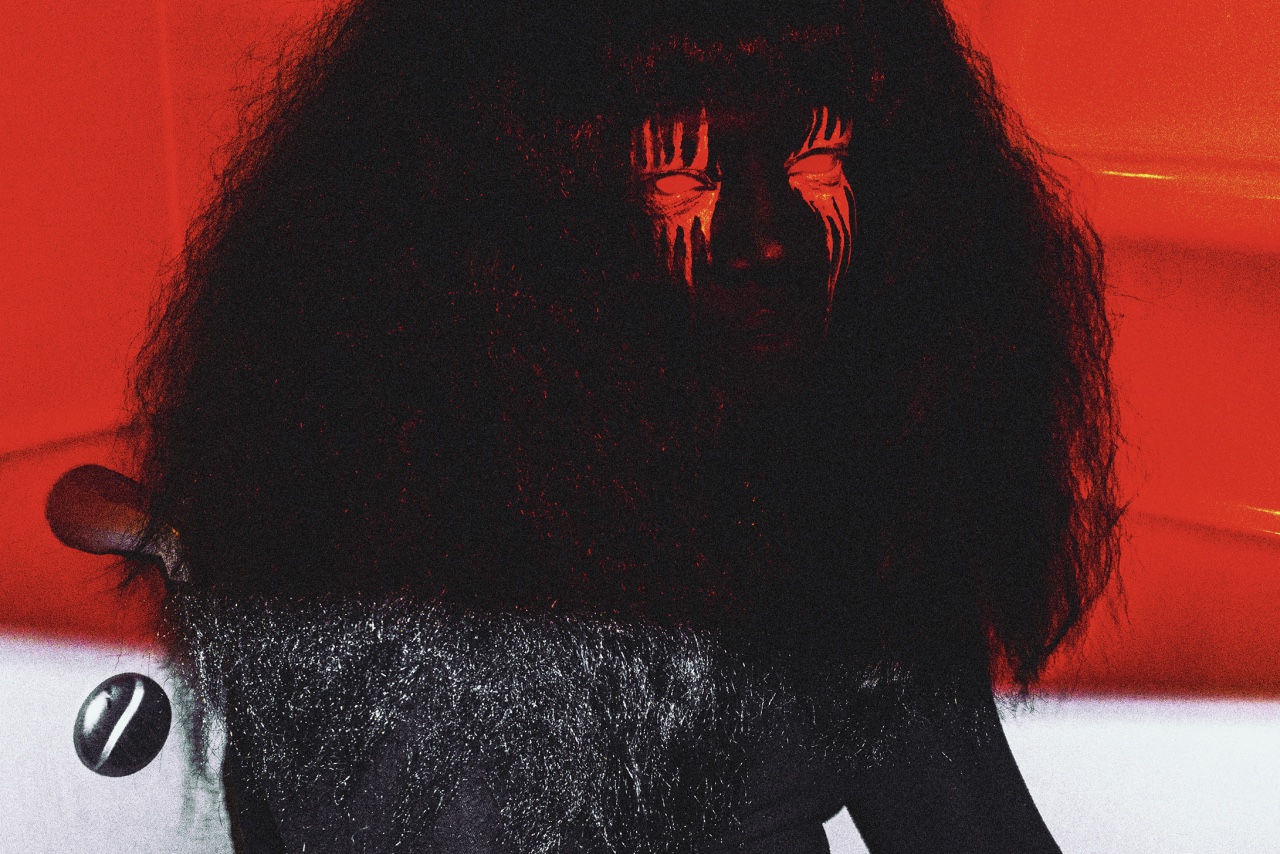Ashanti Mutinta, aka Backxwash, is the rapper the metal world didn’t know it needed until she reinvented heavy music with last year’s astonishing album, God Has Nothing To Do With This Leave Him Out Of It.
A sublime mix of perfectly pitched metal samples, a bleak, horrorcore aesthetic, a visceral rage and lyrical vulnerability, it genuinely sounds like nothing else, taking her from open mic jam sessions to award-winning acclaim at lightning speed.
Now she returns with I Lie Here Buried With My Rings And My Dresses, an even more anguished work that delves into the darkest parts of her psyche over swathes of industrial noise.
“It’s kind of like when you’re watching a horror movie, and you’re anticipating the happy ending, the ending of triumph,” she says, explaining the title via Zoom from her adopted hometown of Montreal. “But this is like The Blair Witch Project where that doesn’t happen, and the protagonist just bleeds out. Pain is the central theme to the project, and this is me not fighting back. I think there was more of a fighting chance with the previous one. This one is kind of like being OK with the pain and just bleeding out.”
That we’re talking to Ashanti at all today is a minor miracle. Clean, sober, and having accepted her own gender identity and come out as a trans woman in recent years, she’s weathered more storms, wrestled more demons, than most of us can imagine, and lives to tell the tale. But the new record tells of a bleak alternative reality, the one she was living in 2012, when her main aim in life was to end it.
“I thought there was no hope,” she explains. “In 2012 I had systematically planned that I was going to die at the end of the year. I was drunk, I was on drugs and just not in the right mind space. My brother came to live in Canada, so I postponed it; I thought I’d wait until he settled in. That became three months, then six months, then a year. Until eventually I never followed through with it. I struggle a lot with suicidal thoughts, and I thought it would be nice just to lay all of that out on a record. I’d never gone as graphic as I did on this record. There’s a mixture of this heavy industrial sound over this really graphic, violent content.”

Ashanti was born and raised in Zambia, to a deeply religious family. She got into hip hop through her sister’s CD collection – Jay-Z, Nas, The Notorious B.I.G. At 12 years old she was experimenting with making beats with a crew of like-minded friends and being taken to rap battles by her older cousins. “We thought we were going to be the next Wu-Tang or something,” she says with a laugh.
At the same time, she discovered Linkin Park – her favourite band – Black Sabbath (“that terrified me”) and nu metal, before moving on to Nine Inch Nails, black metal, doom, Candlemass, System Of A Down and post-rock albums such as 2000’s Lift Your Skinny Fists Like Antennas To Heaven by Godspeed You! Black Emperor – a band who would have a huge personal influence in the future. Inspired, she tried to mimic what metal drums and guitars would sound like if they were plotted on a computer.
“I love the existentialism in metal as well,” she says. “Growing up in such a Christian household, listening to that is very taboo. But there’s a certain power to sneaking out and listening to it, because it’s like, ‘Hmm, why don’t you want me to hear this?’ Listening to it has you questioning a lot of stuff that you were told; there’s freedom to that.”
Religion was the cornerstone of her life back in Zambia, and her struggles with the belief system in which she was raised rage on God Has Nothing… Sleeping, waking, eating – everything was shrouded in prayer, while fear of incurring the wrath of God was a constant companion. Different denominations came and went – Jehovah’s Witness, Seventh Day Adventist, “Catholic for two weeks”, Pentecostal – none of them particularly welcoming to members of the LGBTQ+ community.
“Your moral compass is determined on whether it makes sense from a religious standpoint, which is not really the best environment for a queer person like me
to grow up in,” Ashanti says. “You’re not given the luxury to question all of these structures. There’s one Bible verse that terrified me: ‘Our Lord is a jealous Lord.’ That freaked the fuck out of me. I was just like, ‘Jesus, I’m afraid to even think right now because I don’t wanna get struck down’. We thought the only way to protect each other was by staying true to the word of God. But I’m learning that, growing up, there’s a lot of trauma that’s been imposed on you.”
Because of this, Ashanti didn’t come out until she moved to Montreal, but deep down, she says, she always knew. An androgynous child, her peers would make fun of her and call her weird.
“There was one moment when my auntie came to help us get ready for school,” she remembers. “My auntie didn’t know if I was a boy or girl so she brought me this dress, and I just took it. My mum came running, ‘No, no, that’s a boy!’ And my perspective on myself changed until I grew up and all of that started to make sense. For god’s sake, your favourite Disney movie was Mulan! That should have explained everything! You’re crying during the gender-bending scenes! That’s why it’s always so heartwarming to me to see kids of 13, 14, who have the full support of their parents. Imagine your parents supporting you all the way, without you having to hide anything.”
These days, after a brief atheist phase when she first moved to Canada, Ashanti has embraced the spirituality of her tribe, the Tumbuka, which is all about respecting and honouring the ancestors. Good things, she explains, have started to happen since she took that path.
“Signs started happening,” she explains. “One was surreal. I was working on a video, we needed to make a mask to represent my tribe. As I was making my mask, we were in these tall buildings in the city, and this hawk just comes to the window and sits there and stares at us. It felt like the ancestors were just saying, ‘This is fine, I notice what you’re doing and it’s OK.’ I like to reflect the spirituality in my songs as well. I like it because it aligns with my morals; it doesn’t feel like I’m being brainwashed, it’s just like this is where I need to be.”
The physical way out of her stifling background was a computer science course in British Columbia. But it wasn’t the escape she’d hoped for. Feeling trapped and uninspired in a drab small city, while still working out her identity, things got dark. The drug-taking started, and the thoughts of self-harm and taking her own life began to run rampant.
“I didn’t want to feel anything,” she says. “I used to take a lot of MDMA. It can have serious detrimental side effects on you, but I didn’t care, I was really addicted to being able to feel some sort of happiness, some sort of bliss during that point. That was just my way of numbing it. I had a huge drinking problem as well.”

Isolated, depressed and full of self-loathing, it got to the point where Ashanti was chugging any pills she could get her hands on. A danger to herself, clearly something had to give. The move to Montreal provided her salvation – although that got off to a rocky start when she found herself living above a racist neighbour.
Montreal is a deeply creative city, and Ashanti swiftly fell in love with it. She found a network of venues putting on jam sessions, noise shows and cyphers – a type of rap battle – that reignited her love of music and reawakened her creative muse. Working in IT by day, she was sowing the seeds of the Backxwash project by night, starting with a drunken performance at a local open mic night.
“I think I made an ass of myself, but it was so fun,” she says. “I felt that euphoria from when you’re rapping and the crowd is responding to it.”
Surrounded by like-minded people, it was here that she finally felt free to embrace her own identity and come out as trans. Her family were not supportive – she says she’s back in touch with her sister, who lives in Australia, a little bit, but isn’t really in contact with anyone back in Zambia. A few close friends let her down, too, but finally she’s able to express herself as herself.
“I first came out as bi,” she says. “There was a moment when I had to apply for my work permit to stay in Canada, and I was afraid that if I got sent back, it would be over for me in terms of how I can express myself. I thought that would be the end of it, but it was just the beginning, I’m a trans woman now. I want to make sure the people around me are OK with the new developments. If they stop talking to me that’s great because I don’t want those types of people around me anyway.”
After taking a while to hone her sound – initially, she says, she compromised too much – she hit on gold with God Has Nothing…, when she finally let her love of the dark side, horror movies and her own vulnerability run wild. Bigged up by her heroes such as Godspeed You! Black Emperor and rapper Danny Brown, the final vindication came when she won the prestigious Canadian Polaris Music Prize.
There was a slight hitch when she was forced to remove the album from streaming sites due to uncleared samples – including Ozzy’s unmistakable wail from Black Sabbath by Black Sabbath – something she describes as “educational”. This time, on I Lie Here Buried With My Rings And My Dresses, the only musical sample is Godspeed’s Static. Guitars and screams are provided by Ada Rook of noise-pop duo Black Dresses, while other sounds come from field recordings – tribal singing, a cat, pain therapy tapes (“my version of a parental advisory warning to say that topics in here might be heavy”). It’s a masterpiece for us, and raw therapy presented in all its naked anguish for her. And while it details the most harrowing period of her life, it represents a bold and bright future, one that she is more than ready to face head-on.
“I’m really happy right now,” she says. “The gift of being able to express yourself as freely as possible is taken for granted, but it’s probably one of the most important things that you can ever obtain. Never let anyone try to steal that from you.”
Published in Metal Hammer #351. I Lie Here Buried With My Rings And My Dresses is out now available via the Backxwash Bandcamp page

